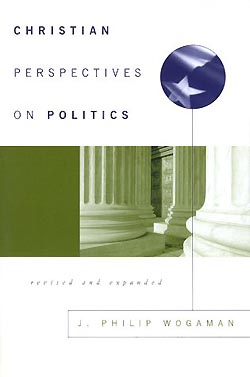
|
Christianity and the Political Process
A Book Review by Tolly Kizilos The author of this well organized and carefully researched book encourages Christians to continue being involved in the political process as they have been since the times of the early Church. "When Christians seek to exclude politics from their thinking, they are bound to distort their theologies for politics is an inescapable aspect of human existence, with direct relevance to the divine/human encounter," the author warns. Cynicism about the role of government goes against a Christian's responsibility to improve the world. God has many ways of providential action in the world, and we cannot presume to exclude politics, nor can we cease being His instruments in this field. But what kinds of politics should a Christian have? We all know that there are great differences between the pacifist Quakers, the ultra-conservative Jerry Falwell and other Fundamentalists and some of us, in other Churches. The author distinguishes the perspectives of present-day Christians into five groups: 1) Christian Pacifist and Anarchist Perspectives; 2) Christian Liberationist Perspectives; 3) Neo-conservative Christian Perspectives; 4) Evangelical Perspectives: Right and Left, and 5) Mainstream Liberal Christian Perspectives. 1) Christian Pacifist and Anarchist Perspectives: Christians in this group hold that contemporary problems cannot be solved through politics. The only thing Christians can do is to bear witness -- be the "odd people who instead of doing like the others, i.e. hating one another for political reasons, are full of love for one another . . ."
3) Neo-conservative Christian Perspectives: This group of Christians defends "the limited state," believing "that the state is not the whole society." The author acknowledges some beneficial influences of this viewpoint to the political landscape, but ultimately he sees a fundamental flaw: "Neo-conservatives are better at law than grace and grace, more than law, is where God, as revealed in Christ, is to be found." 4) Evangelical Perspectives: Evangelicals of the Right are what the media call "fundamentalist Christians" or "the religious right," and their political views are very conservative. A basic drive for this group is to translate biblical commandments literally into contemporary American law. "Social progress comes with the accumulation and development of wealth . . . which is a product of work and thrift, in short, of character." They challenge what is perceived to be the dominant parallel religion of secular humanism. Cal Thomas and Ed Dobson, former leaders of Falwell's Moral Majority, have challenged the religious right's political behavior for its lusting after power: "Power," writes Thomas, "is the ultimate aphrodisiac . . ." Evangelicals of the Left adhere to a conservative theology while pressing for a more liberal political agenda. Tony Campolo, Jim Wallis and others criticize the Evangelical Right's "narrow, right-wing partisanship. Wallis reminds us that "the Bible insists that the best test of a nation's righteousness is how it treats the poorest and most vulnerable in its midst." The Evangelical Left has a lot in common with the Mainstream Liberals, the last group we'll examine. 5) Mainstream Liberal Christian Perspectives: The Christians of this group believe that "biblical thought is quite aware of oppressive forces against which the government must act." "Justice often requires an expanded role for the state." The theological perspective of this group, influenced by the great theologian Reinhold Niebuhr, recognizes that human beings are both good and evil.. These views are quite apart from the evangelical right. Mainstream Liberals have a generally positive view of government and espouse a variety of specific reforms: for civil rights struggles; against poverty and unemployment and for public welfare, job training , a more progressive tax structure and adequate health care for all. At the international level, mainstream liberals support disarmament negotiations, an increased role for the United Nations, more generous foreign aid, pressure for human rights, greater regulation of multinational corporations and trade policies that better serve the developing countries. In contrast with the neo-conservatives, mainstream liberals welcome change in response to new problems. "Traditional practice and wisdom may indeed be valuable, but tradition is dynamic and ongoing. It changes and develops. And wisdom has never been confined to one tradition or period of the past." The author identifies himself as a mainstream liberal Christian, and his book contains not only the taxonomy I sketched above, but also a lot of useful insights on many issues with which we struggle today. Among these issues are Church/State relations, the state and criminal justice, legislating social morality, and God's activity within and beyond human history. The author is a senior minister in the Methodist Church and has taught Ethics at Wesley Theological Seminary. His book is a must reading for any Christian who strives for integration of biblical teachings with a citizen's duties. (Originally posted October 2003; reformatted 20 May 2008) For more information about the author, see the HCS biographical sketch about him at the URL: http://www.helleniccomserve.com/tollykizilosbio.html. HCS readers may wish to read releases or announcements of other books in our Books section or in our extensive, permanent archives at the URL http://www.helleniccomserve.com/archivebookreviewsandreleases.html.
2000 © Hellenic Communication Service, L.L.C. All Rights Reserved. |

